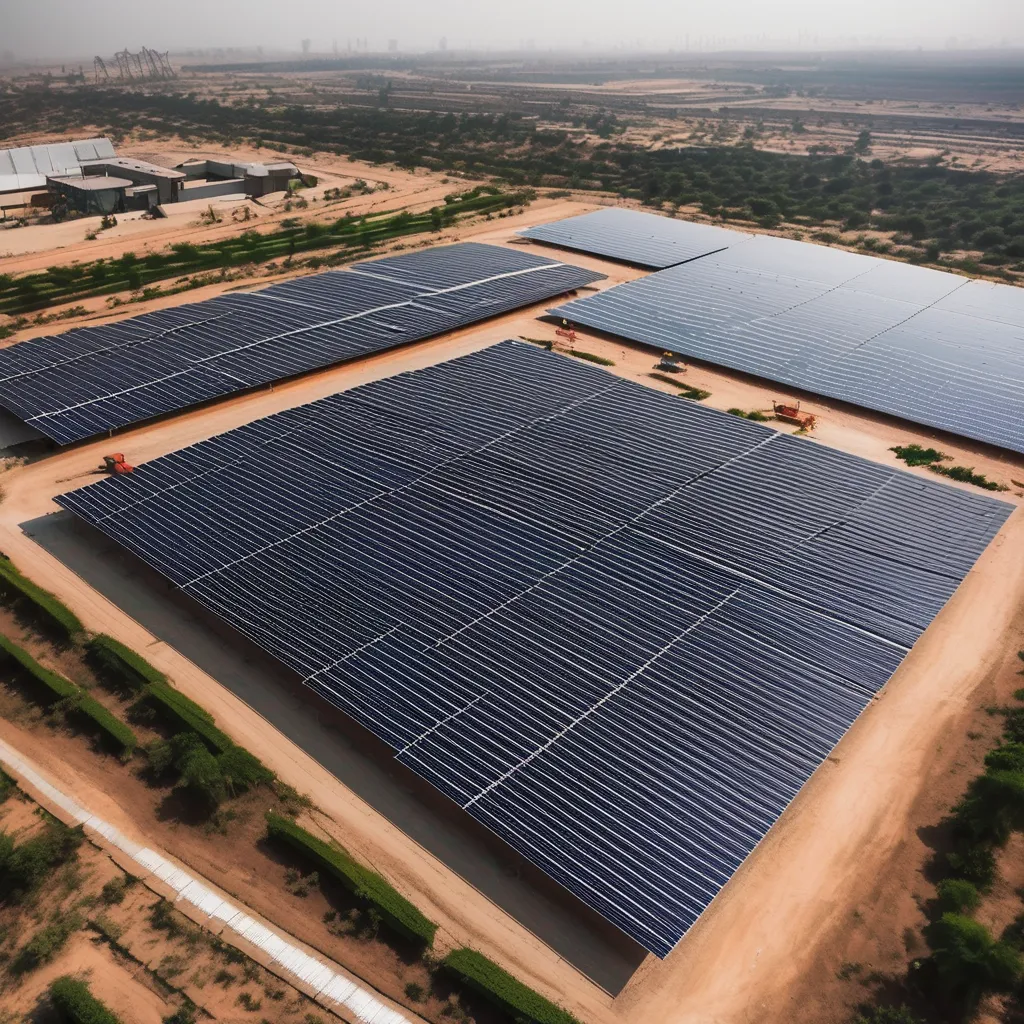Pakistan’s Solar Revolution: How Industries Are Harnessing the Power of the Sun
Imagine a future where industries thrive without harming the planet. A future where energy is clean, sustainable, and virtually unlimited. Sounds like a utopian dream. Welcome to the reality of 2025, where solar energy is revolutionizing the way industries operate.
As the world shifts towards a more sustainable tomorrow, industries are rapidly embracing solar power as a key component of their energy mix. But what’s driving this seismic shift? Why are companies, big and small, making the switch to solar? In this article, we’ll uncover the top reasons behind the solar revolution that’s transforming industries worldwide.

The journey began in the 1980s, when Pakistan’s first solar-powered systems were installed, primarily for rural electrification and telecommunications. Fast forward to the 2000s, when the Government of Pakistan introduced policies to promote renewable energy, including solar power. The Alternative Energy Development Board (AEDB) was established to facilitate the development of renewable energy projects, and in 2015, Pakistan’s first solar power policy was introduced, offering incentives for investors and developers. Today, solar energy has become a viable option for industries in Pakistan, with companies like Fauji Fertilizer, Kohinoor Textile Mills, and Nishat Mills investing in solar power.
As technology advances, Pakistan’s solar industry is booming. Locally manufactured solar panels have improved efficiency and reduced costs, while imported solar inverters have enabled efficient conversion of DC power to AC power. The results are impressive: textile companies like Kohinoor Textile Mills and Gul Ahmed Textile Mills have installed solar power systems to reduce energy costs, while fertilizer companies like Fauji Fertilizer have gone solar to power their plants. Even the cement industry is getting in on the action, with companies like Lucky Cement and DG Khan Cement investing in solar power to reduce their reliance on fossil fuels. The future of Pakistan’s industries has never looked brighter!
Shining a Light on Savings: Why Solar Energy is the Smart Choice for Industries
As industries in Pakistan continue to navigate the challenges of energy sustainability, one thing is clear: solar energy is becoming the go-to solution for companies looking to reduce their energy costs. But what’s driving this shift towards solar? Let’s take a closer look at the top reasons why industries are making the switch.

Cost-Effectiveness: The Bottom-Line Benefit
The decreasing costs of solar panels and installation have made solar energy a viable option for industries. With the cost of solar panels dropping by over 70% in the last decade, companies can now invest in solar energy without breaking the bank. Moreover, the potential for significant energy cost savings is a major draw. By harnessing the power of the sun, industries can reduce their reliance on fossil fuels and lower their energy bills. And with government incentives and subsidies available, the financial benefits of solar energy are hard to ignore.
Going Green: How Solar Energy is powering a Sustainable Future for Industries
As the world grapples with the challenges of climate change, industries in Pakistan are recognizing the importance of environmental sustainability. Solar energy is emerging as a key player in this quest for sustainability, offering a cleaner, greener alternative to traditional fossil fuels. Let’s explore the ways in which solar energy is supporting environmental sustainability in industries.

Reducing Carbon Footprint and Greenhouse Gas Emissions
One of the most significant benefits of solar energy is its ability to reduce carbon footprint and greenhouse gas emissions. By harnessing the power of the sun, industries can significantly decrease their reliance on fossil fuels, resulting in lower emissions and a reduced carbon footprint. This not only contributes to a cleaner environment but also helps industries meet their sustainability goals.
Compliance with Environmental Regulations
In Pakistan, environmental regulations are becoming increasingly stringent, with industries facing growing pressure to reduce their environmental impact. Solar energy offers a solution to this challenge, enabling industries to comply with environmental regulations while also reducing their energy costs. By investing in solar energy, industries can demonstrate their commitment to sustainability and avoid the risks associated with non-compliance.
Improving Corporate Social Responsibility Image
In today’s socially conscious world, corporate social responsibility (CSR) is a key consideration for industries. By embracing solar energy, industries can enhance their CSR image, demonstrating their commitment to sustainability and environmental stewardship. This can have a positive impact on brand reputation, customer loyalty, and stakeholder engagement, ultimately driving business success.
Breaking Free from the Grid: How Solar Energy is Empowering Industries with Energy Independence
For industries in Pakistan, energy independence is a highly coveted goal. With solar energy, companies can reduce their reliance on the grid and volatile energy prices, ensuring a stable and reliable energy supply. Let’s explore the benefits of energy independence through solar energy.
Reducing Reliance on the Grid and Volatile Energy Prices
Pakistan’s grid electricity is often plagued by outages, voltage fluctuations, and price volatility. By investing in solar energy, industries can reduce their reliance on the grid and mitigate the risks associated with energy price fluctuations. Solar energy provides a predictable and stable source of power, enabling industries to better manage their energy costs and maintain business continuity.
Ensuring a Stable and Reliable Energy Supply
Solar energy offers industries a reliable and consistent source of power, unaffected by grid outages or energy price volatility. With a solar power system, industries can generate their own electricity, ensuring a stable energy supply that meets their operational needs. This is particularly important for industries with high energy demands, such as manufacturing, textiles, and food processing. By harnessing the power of the sun, industries can maintain business continuity, reduce downtime, and increase productivity.
Pakistan’s Solar Revolution How Government Policies and Incentives are Driving Adoption in Pakistan
The Pakistani government has recognized the potential of solar energy to transform the country’s energy landscape. To encourage the adoption of solar energy, the government has introduced a range of policies and incentives that make it more attractive and affordable for industries to invest in solar power. Let’s explore the key government policies and incentives that are driving the growth of solar energy in Pakistan.
Net Metering Policies
Net metering policies allow industries to generate their own electricity and export any surplus to the grid. In Pakistan, the net metering policy enables industries to sell excess energy back to the grid at a predetermined rate, providing a significant financial incentive. This policy has been instrumental in encouraging industries to invest in solar energy, as it allows them to offset their energy costs and generate additional revenue.
Tax Credits and Rebates
The Pakistani government offers tax credits and rebates to industries that invest in solar energy. These incentives help to reduce the upfront costs of solar panel installation, making it more affordable for industries to adopt solar power. By providing tax credits and rebates, the government is encouraging industries to invest in solar energy, which in turn is driving growth and job creation in the sector.
Feed-in Tariffs
Feed-in tariffs (FITs) are a key policy instrument used by the Pakistani government to encourage the adoption of solar energy. FITs guarantee a fixed price for solar energy producers to sell their electricity to the grid. This provides a predictable revenue stream for industries that invest in solar energy, enabling them to plan and invest with confidence. By offering FITs, the government is creating a favorable business environment for solar energy, which is driving investment and growth in the sector.
Unlocking the Power of Solar Energy: Benefits for Industries in Pakistan
As industries in Pakistan continue to navigate the challenges of energy sustainability, solar power is emerging as a game-changer. By harnessing the power of the sun, industries can unlock a wide range of benefits that enhance their competitiveness, improve their brand image, and contribute to a more sustainable future.
Reduced Operating Costs: A Boost to the Bottom Line
Solar power helps industries reduce their operating costs by lowering electricity bills and increasing energy efficiency. With solar energy, industries can generate their own power and reduce their reliance on the grid, resulting in significant cost savings.
Enhanced Energy Security: A Reliable and Independent Power Supply
Solar power provides industries with a reliable and independent power supply, enhancing their energy security. With solar energy, industries are less vulnerable to grid outages and voltage fluctuations, ensuring business continuity and minimizing downtime.
Improved Brand Image: Demonstrating Commitment to Sustainability
By adopting solar power, industries can demonstrate their commitment to sustainability and improve their brand image. This can lead to increased customer loyalty, improved stakeholder engagement, and enhanced reputation.
Increased Competitiveness: Access to Cheaper and Cleaner Energy
Solar power provides industries with access to cheaper and cleaner energy, increasing their competitiveness. With lower energy costs, industries can invest in growth, innovation, and job creation, driving economic development and prosperity.
Job Creation: Opportunities in Solar Installation, Maintenance, and Manufacturing
The solar industry is creating new job opportunities in installation, maintenance, and manufacturing. As the demand for solar energy continues to grow, industries can tap into this emerging job market, driving employment and economic growth.

Overcoming the Hurdles: Challenges and Considerations for Industrial Solar Power in Pakistan
While solar power offers numerous benefits for industries in Pakistan, there are also several challenges and considerations that must be addressed. By understanding these hurdles, industries can better navigate the transition to solar power and unlock its full potential.
Initial Investment Costs: A Barrier to Entry
One of the primary challenges facing industries in Pakistan is the high upfront cost of installing solar power systems. While the cost of solar panels has decreased over the years, the initial investment can still be prohibitively expensive for some industries. However, with the right financing options and incentives, industries can overcome this barrier and start reaping the benefits of solar power.
Intermittency of Solar Power: A Reliance on Weather Conditions
Solar power is an intermittent energy source that relies on weather conditions. This means that industries must contend with variability in energy generation, which can impact their operations. However, advances in energy storage technologies and grid management systems are helping to mitigate this challenge.
Land Requirements: A Significant Consideration
Large-scale solar installations require significant land areas, which can be a challenge in Pakistan where land is scarce. Industries must carefully consider the land requirements for their solar installations and explore innovative solutions such as rooftop installations or solar parks.
Grid Integration Challenges: A Technical Hurdle
Integrating solar power into existing grids can be a complex technical challenge. Industries must work with grid operators and utilities to ensure that their solar installations are properly integrated into the grid, which requires advanced technologies and infrastructure.
A Brighter Future: Unlocking the Potential of Industrial Solar Power in Pakistan
As Pakistan continues to navigate the challenges of energy sustainability, industrial solar power is poised for significant growth and innovation. The future of industrial solar power holds tremendous promise, driven by emerging technologies, government policies, and increasing public awareness.
Further Growth and Innovation
The industrial solar sector in Pakistan is expected to continue growing, driven by declining solar panel costs, improving technology, and increasing demand for clean energy. As industries seek to reduce their carbon footprint and energy costs, solar power will become an increasingly attractive option.
Emerging Technologies
Several emerging technologies are set to transform the industrial solar landscape in Pakistan. These include:
· Solar-powered microgrids: enabling industries to generate and distribute their own clean energy
· Solar-powered electric vehicles: reducing transportation costs and emissions for industries
· Building-integrated photovoltaics (BIPV): integrating solar panels into building design for increased energy efficiency
Government Policies and Public Awareness
Government policies and public awareness will play a crucial role in promoting industrial solar adoption in Pakistan. Policies such as tax incentives, net metering, and renewable portfolio standards can encourage industries to invest in solar power. Increasing public awareness about the benefits of solar energy can also drive demand and support the growth of the industrial solar sector.
A Sustainable Future
As Pakistan continues to grow and develop, industrial solar power will play an increasingly important role in supporting the country’s energy needs. With the right policies, technologies, and public awareness, Pakistan can unlock the full potential of industrial solar power and create a more sustainable future for generations to come.
Empowering a Sustainable Future: The Rise of Industrial Solar Power in Pakistan
In conclusion, the shift to solar energy among industries in Pakistan is driven by compelling reasons, including cost savings, energy independence, environmental sustainability, and government incentives. As industries continue to adopt solar power, they will reap long-term benefits, including:
· Reduced energy costs and increased competitiveness
· Improved brand image and reputation through environmental stewardship
· Enhanced energy security and reduced reliance on fossil fuels
· Contribution to a cleaner, healthier environment and mitigation of climate change
This transition to solar energy will have far-reaching benefits for businesses, the environment, and society as a whole. As Pakistan continues to grow and develop, industrial solar power will play a vital role in supporting the country’s energy needs, driving economic growth, and promoting environmental sustainability.
A Brighter Future Ahead
As we look to the future, it is clear that industrial solar power will continue to play a transformative role in Pakistan’s energy landscape. With advancements in technology, innovative business models, and supportive government policies, the potential for industrial solar power in Pakistan is vast. As industries, policymakers, and stakeholders work together to harness the power of solar energy, we can create a brighter, more sustainable future for generations to come.
Revolutionizing Industry with Solar Solutions: ESA Energy Private Limited’s Innovative Approach
ESA Energy Private Limited is transforming the industrial sector in Pakistan through its cutting-edge solar solutions. By harnessing the power of solar energy, ESA Energy is helping industries reduce their reliance on fossil fuels, decrease energy costs, and minimize their environmental footprint.Play
200 KW Jan Japan Solar Solution Project of ESA Energy Private Limited
Innovative Solar Solutions
- Solar Power Projects: ESA Energy designs and installs solar power Projects that cater to the specific energy needs of industries, providing a reliable and sustainable source of power.
- Solar Rooftop Solutions: The company offers solar rooftop solutions that enable industries to generate clean energy on-site, reducing their dependence on the grid and lowering energy bills.
- Solar Water Pumping Systems: ESA Energy’s solar water pumping systems provide industries with a sustainable and cost-effective solution for their water needs, ideal for agricultural, textile, and food processing industries.
Benefits for Industries
- Reduced Energy Costs: ESA Energy’s solar solutions help industries decrease their energy expenses, improving their bottom line and competitiveness.
- Increased Energy Independence: By generating their own clean energy, industries can reduce their reliance on the grid and enjoy increased energy independence.
- Environmental Sustainability: ESA Energy’s solar solutions enable industries to minimize their environmental footprint, reducing greenhouse gas emissions and contributing to a cleaner, healthier environment.
Expertise and Support
- Technical Expertise: ESA Energy’s team of experts provides industries with technical guidance and support, ensuring the optimal design, installation, and maintenance of solar solutions.
- Financing Options: The company offers flexible financing options, making it easier for industries to adopt solar solutions and start enjoying the benefits of clean energy.
- Ongoing Monitoring and Maintenance: ESA Energy provides industries with ongoing monitoring and maintenance support, ensuring the optimal performance and longevity of their solar solutions.
By revolutionizing the industrial sector through solar solutions, ESA Energy Private Limited is playing a vital role in promoting sustainable development, reducing environmental pollution, and driving economic growth in Pakistan.
Call Now: 0331-8668855
Email: [email protected]
Website: www.esaenergy.com.pk
Social Media Links
Facebook : https://www.facebook.com/ekramsolaragency
Instagram : https://www.instagram.com/esaenergyofficial/
TikTok : https://www.tiktok.com/@esaenergypvtltd
Linkedin : https://www.linkedin.com/company/esaenergyprivatelimited
Treads : https://www.threads.net/@esaenergyofficial
#RenewableEnergy #SolarPower #GreenEnergy #CleanEnergy #SustainableEnergy #EnergyEfficiency #SolarSolutions #EcoFriendly #GoGreen #SaveThePlanet #SwitchToSolar #ZeroElectricityBills #solarpower #renewableenergy #solarpanels #solarenergy #energy #CleanEnergyPakistan #ESAenergy #ESAenergyPakistan #PoweredByESA #ESAIndustrialSolutions #ESAForIndustry #Innovation #SustainableFuture




